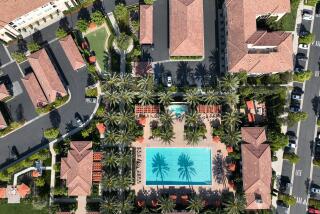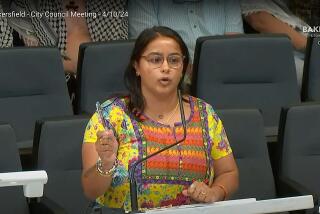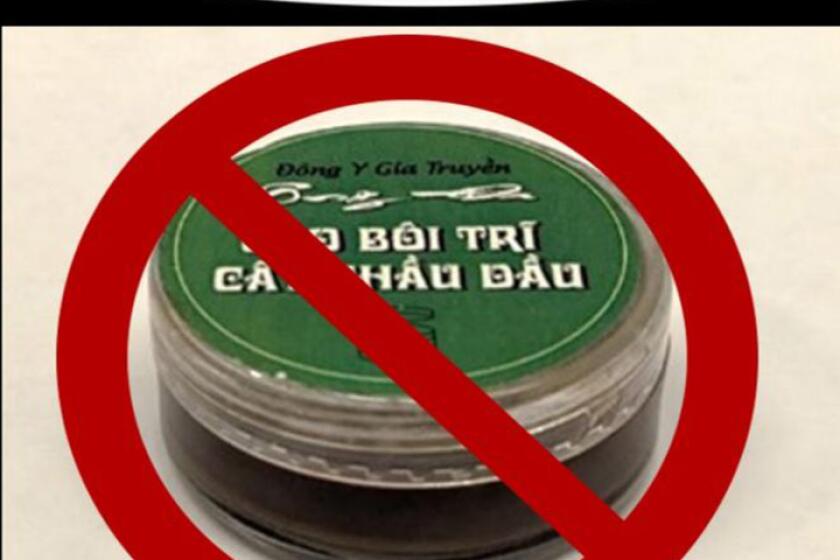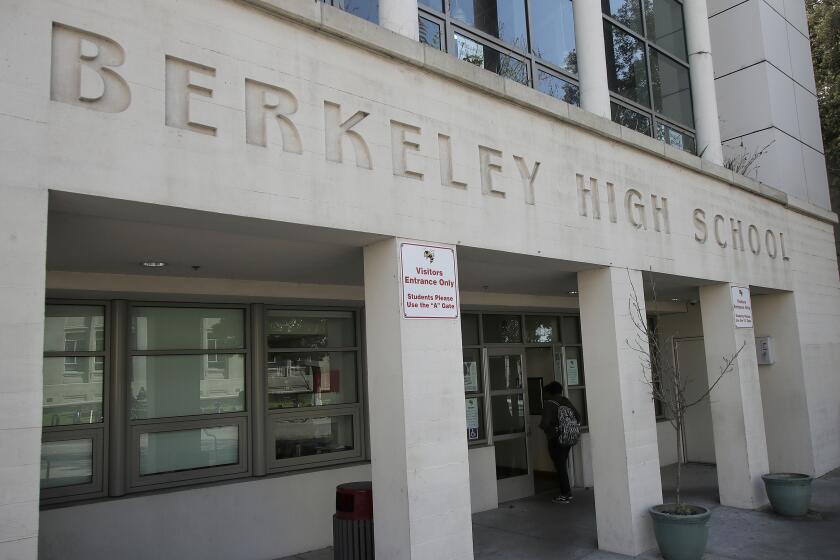Billboard-ban lawsuit centers on free speech
The Los Angeles City Council has long been accused of casting votes to curry favor with campaign contributors, lobbying firms and other well-connected players at City Hall.
Council members deny that such activities occur. But even if they did, would such behavior violate the public’s right to free speech?
That’s an argument being considered by the U.S. 9th Circuit Court of Appeals, where two sign companies are suing to strike down the city’s 2002 ban on new billboards and multistory “supergraphics” -- images stretched across the sides of buildings.
Beverly Hills-based SkyTag told a three-judge panel that the council violated the company’s 1st Amendment rights by creating a sign-permit system that favors some companies and snubs others. To back up its case, SkyTag pointed to Anschutz Entertainment Group, which persuaded council members to allow new, oversized signs at its L.A. Live entertainment complex.
“The danger of censorship takes many different forms,” SkyTag attorney Gary Mobley told the judges last month. “One of the most pervasive forms of censorship is to grant 1st Amendment rights to . . . the people that you’re in bed with -- your cronies, the developers, AEG.”
Contributions and political influence have been a recurring theme in the city’s billboard debate. In 2001, Clear Channel Outdoor and other sign companies spent $425,000 on billboards that promoted the successful campaign of Rocky Delgadillo, then a candidate for city attorney. Five years later, Delgadillo crafted a legal settlement that allowed Clear Channel to convert up to 420 billboards to more lucrative digital formats.
AEG, its employees and its affiliates have contributed nearly $1.2 million to city candidates and ballot campaigns since 2000, according to city and state records. During the same period, the company persuaded the council to approve new, oversized signs in the city’s sports and entertainment district downtown.
The judges reviewing the case sounded skeptical about Mobley’s argument. Judge Kim Wardlaw suggested that the best way to fight cronyism is to ensure that an offending politician isn’t reelected. “Your concern is more with the way the political process works, not with the claim that your 1st Amendment rights are actually being violated,” she told Mobley.
Two of the three judges reviewing the case have their own familiarity with City Hall.
Wardlaw administered the oath of office to Mayor Richard Riordan at the start of his second term in 1997. Her husband, Bill Wardlaw, was a high-level advisor to both Riordan and former Mayor James K. Hahn while they were in office -- and has contributed at least $500 each to nine of the currentcouncil’s 15 members.
Another panelist, Judge Stephen Reinhardt, administered the oath of office in 2005 to newly elected Mayor Antonio Villaraigosa, who later appointed Reinhardt’s wife, Ramona Ripston, to a city-county commission dealing with homelessness. Ripston has contributed $3,450 to Villaraigosa over the last decade. She is also the head of the American Civil Liberties Union of Southern California, which helped SkyTag President Michael McNeilly wage a free-speech lawsuit against the city of Los Angeles.
In that case, McNeilly said his rights were violated by city officials who demanded that he remove a 12-story image of a fireman and the Statue of Liberty from the side of an office building in Westwood. An ACLU lawyer was one of several attorneys to sign off on a legal settlement in 2003 that allowed McNeilly to maintain commercial images on the building, such as an ad for the recent film “Confessions of a Shopaholic.”
Asked about the latest SkyTag case, City Council President Eric Garcetti said his colleagues are more responsive to their constituents than to donors. “The community is a stronger power player than any one of these special interests,” he said.
SkyTag appeared before the 9th Circuit along with World Wide Rush, a sign company with a separate lawsuit against the 2002 billboard ban. World Wide Rush sued the city two years ago, saying the ban was written in a way that allowed too many exceptions -- sign districts, zoning districts and special agreements reached between the council and individual real estate developers.
U.S. District Judge Audrey B. Collins sided with World Wide Rush, barring the city from removing new supergraphics. SkyTag then filed its own lawsuit and grabbed public attention by placing giant Statue of Liberty images on buildings throughout the city.
World Wide Rush and SkyTag both argued that the 2002 billboard ban gave the council “unfettered discretion” to hand out exceptions to constitutionally protected 1st Amendment content. As part of the challenge, they focused on a sign district created on a bus yard next to the 10 Freeway.
The council approved that district in 2008, allowing two digital signs to go up in exchange for the removal of more than a dozen nondigital billboards from Santa Monica Boulevard. Mobley, the SkyTag attorney, said the sign district was the product of “offensive horse trading” by the council.
“It’s a great deal for Clear Channel because they get freeway exposure” for their digital signs, he said. “But to other companies, it stinks.”
Deputy City Atty. Michael Bostrom defended the exceptions to the ban, saying the council is a legislative body and can amend its laws as it sees fit. Each exception, he said, was simply an effort to update the city’s billboard law.
More to Read
Start your day right
Sign up for Essential California for news, features and recommendations from the L.A. Times and beyond in your inbox six days a week.
You may occasionally receive promotional content from the Los Angeles Times.







